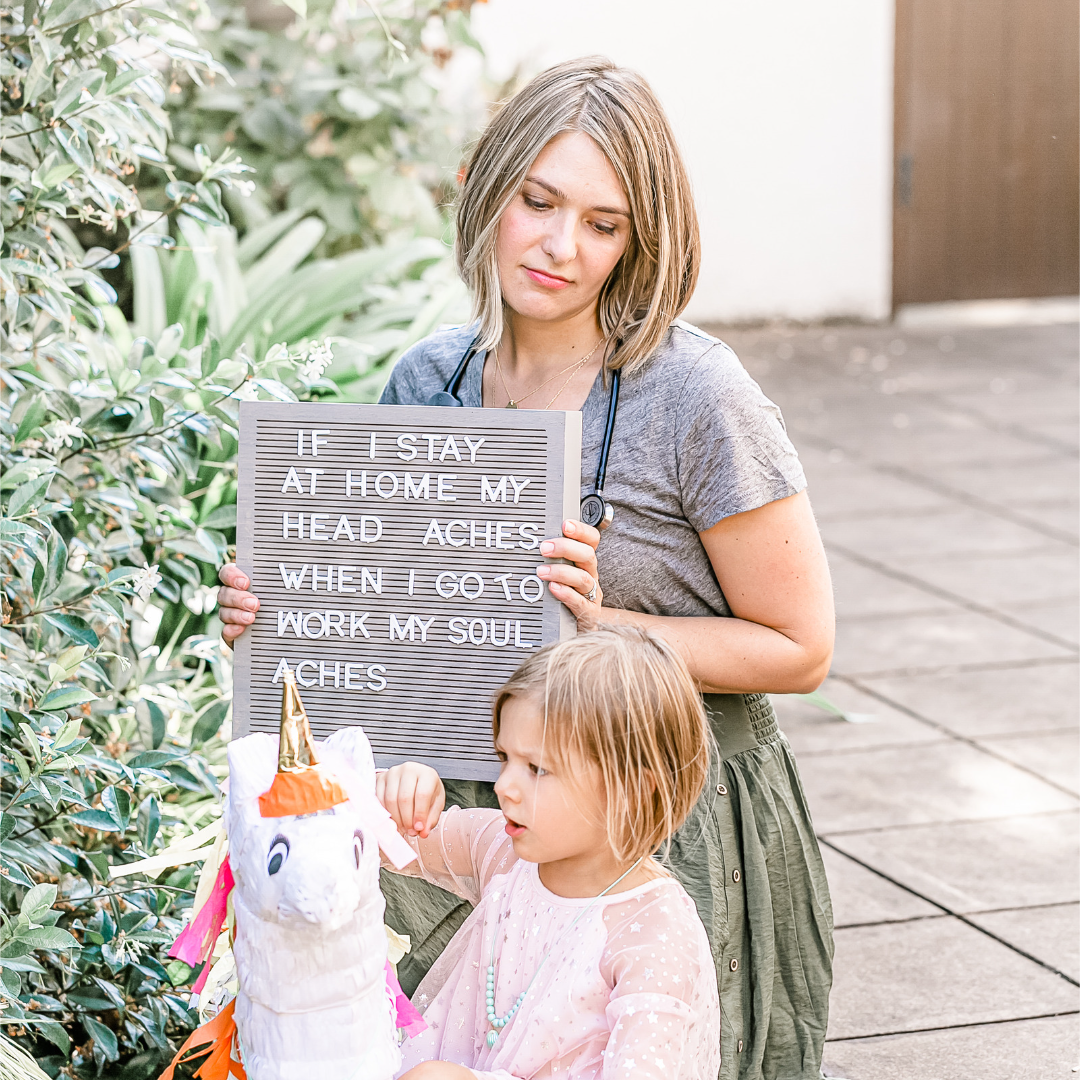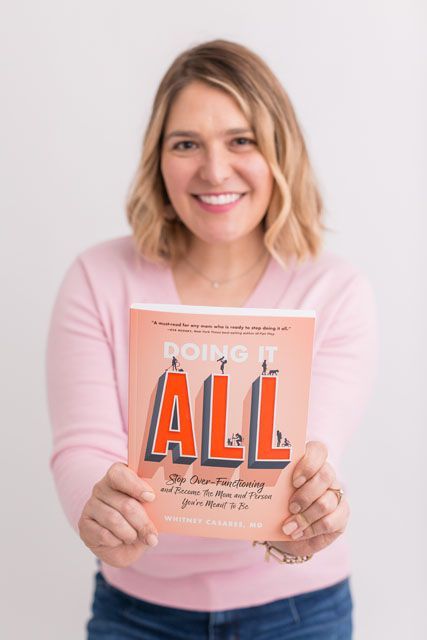EPISODE TAKEAWAYS:
- We should approach every situation with grace for the moment and realize that every baby’s sleep needs to be looked at with personalized attention.
- Every mom has it in them to figure out their baby’s sleep needs. But there are a lot of sleep signs that they might be missing (which is why professional help can be so amazing!)
- Every baby has different sleep needs.
- Your goal should never be, "I want to sleep like their baby." Your goal should be, "I want to help my baby sleep their best sleep."
WHAT'S INSIDE:
READ THE ENTIRE TRANSCRIPT BELOW
Dr. Whitney: Hello again, everyone. And welcome back to the Modern Mommy Doc Podcast. This week, we are talking about potentially one of the heaviest topics that weighs on a mom's mind, especially a working mom's mind, which is sleep. And especially when you have an infant, when you have a little baby, when you're thinking about going back to work, how do we navigate sleep? Because gosh, when our babies don't have good sleep, then we don't have good sleep. And so many issues then come as a fallout of that. So today I am really thrilled to welcome my guest Andrea De La Torre who is here today to talk with me about this topic. Welcome. Welcome, Andrea. Thanks for being here.
Andrea: Thank you. Thanks for having me. I love being on podcasts, especially ones that are geared towards moms. So thanks for having me on here and let me know if I'm not talking loud enough. I am a very soft-spoken person.
Dr. Whitney:
You're totally fine. We can hear you great. No worries. Okay. So tell me first--and really feel like you can totally dig into this for as long as you want about your story. What made it so that you're so passionate about this topic? I mean, now you share about it on Instagram and all over the web to tons of moms. So what made you feel really passionate about this topic?
Andrea: Okay. So let me start with the way, way, beginning. I wanted to be a teacher since I was little. I have all these notebooks where I graded myself and I would create these fake tests for my imaginary friends. And so all I wanted to do was be a teacher and I went to school to be a teacher. I got to be a teacher, but then I always had this dream of also being a mom. And I was teaching in public school, a title one school. And it's very, very intense work. You work from six to seven. You don't get to leave, right? And so we got married and we had a baby really quickly. And then I realized I couldn't give a hundred percent to teaching and to being a mom. I just couldn't do it.
Andrea: And I felt like I was failing. So I decided to stay at home. But this desire to teach and help is always still in me. And also I wasn't sleeping. My little guy was waking up every two to three hours for the first five months of his life. And I just kept thinking, it'll get better, it'll get better, it'll get better. And it didn't get better. And I was unhappy being at home instead of being teaching. And so I said, you know what, I'm going to find a way to marry those two passions. And I'm going to find a way to fix the sleep. And then maybe also I could do a side business thing for me, where I can teach other moms about sleep. So I decided to learn everything I could about sleep.
And then I found a certification process, got certified, realized what was missing and why he wasn't sleeping. And then I realized I could make a big difference because there was a huge gap for moms. I realized that the thing that's missing is more understanding and more personalization for sleep help for each mom. Even for a stay-at-home mom, they have very different needs than someone who goes to work all day or someone who works part-time or someone who goes to work, but has a daycare or a nanny or a mom or mother-in-law or whatever. There's just so much personalization needed in how we approach sleep.
And it is very rarely just like, "Here's the textbook. Read it and you'll get your baby to sleep." You told me to go deep. So I am a talker. So tell me when to stop talking. So that's what I decided to do. I was going to create a very personalized approach. And so I was doing one-on-ones and I would help someone for a full two weeks until I helped them. But then I started to grow a lot by word of mouth and started to spread. What I was doing was coming from the heart. And so I think when you do things kindly and with the best intentions, I think it just spreads out eventually. And that's what happened. And then eventually I couldn't help people. I was turning people away and it was hurting my heart to say to a mom who was sleep deprived, "No, I can't help you."
So I said, "You know what? I need to find a way to automate this all." And so I spent three months writing everything I knew and creating a product where people could go in and fill out a survey and then have a personalized approach to baby sleep. And so now I can do that. And so people can get that, but I can also spend my time on Instagram teaching about baby sleep, not charging anything or whatever. But I can still do all that and help moms realize that they have it in them to figure it out. But there are a lot of sleep signs that they might be missing.
Dr. Whitney:
I love what you just said they have it in them to figure it out. Because I think that's the key, right? When you have sleep woes happening with your baby. I remember, as a pediatrician, holding my baby so tightly and my husband looking at me and saying, "Are you going to shake her? Because you literally look like you're about to shake this baby. I need to take her from you." Because I was so frustrated. And the thing that really struck me in that moment was that it wasn't about her not getting sleep. Yes. I was sleep deprived. But it was about this feeling of shame or inadequacy.
Andrea: Yeah. It's like, "Why can't I figure this out?"

Dr. Whitney: Yes. Why can I not figure it out? And when you look around you, yes. People talk about how babies have a difficult time sleeping, but it feels like there must be some magic solution that you're not finding. Like everybody else is privy to it. This product gets 80,000 Amazon reviews and is amazing for everyone else. But doesn't work for you. It must mean that there's something you're doing.
Andrea: Yeah. And that's something else I like to tackle a lot. That's one of my passions to help you listen to your intuition more. And also to realize if you haven't figured it out, you just haven't figured it out. It's not that you've failed at it. There's something missing that you will figure it out. Or your kid's just in a stage where they don't want to sleep. It's like nutrition. It's like with everything. There's no way anybody can know everything. My little guy was so constipated and I had no idea what to do. I just had no idea. And I was like, "I should know this. Why don't I know how to help my baby boy?" But there's just no way we can know everything and that's okay. But there's also people that can help you get there.
Dr. Whitney:
Okay, so share with us, because I know there are people that tuned into this episode because they are feeling really desperate and they want to get some "aha" moments here. Share with me some things that you learned when you had your baby or that you've learned as you've helped other moms that are kind of "aha" moments that are major concepts around baby sleep that you wish everyone knew.
Andrea: So the first one is going to sound stupid, because it's gonna be so plain, but every baby is different. And I know that's like, "Okay, well I know that." But it's true. You might have that neighbor that says, "I nurse my baby to sleep and they slept all night." Maybe your baby can't do that. Maybe their proprioceptive system is a lot more matured or a lot more intense. And they notice differences a lot more than that baby. And so your baby won't be able to be nursed and sleep all night or maybe your baby just needs more feedings than that baby at night. Or maybe you're giving less milk baby to baby than that person. Every single person is different. And so your goal should never be, "I want to sleep like their baby." Your goal should be, "I want to help my baby sleep their best sleep." And once you're there, it's a lot easier, right? So that's number one, "aha" moment. And it sounds stupid again. But if you really, really internalize that, I think that's going to help.
Number two is that many, many babies sleep through the night with whatever help you're giving them at the beginning of the night, right? So if you are nursing your baby to sleep or you are rocking them to sleep. Many, many babies want that every time they cycle through their sleep and four months old, six months old might be doing like four or five cycles. And so they might be asking for that help to go back to sleep four or five times a night. And so that might be the reason that you're not getting long stretches is because they're getting used to getting that help. It's our survival instincts like Neanderthals. I'm sleeping here. There's caves around me. I wake up, there's no caves, something's wrong. I'm going to call up for help, right? And so that's what happens to a lot of babies they say, "I fell asleep nursing. Milk was coming in my mouth. Now I'm awake. What do I need? I'm going to call until I get that milk again, right? And so that's a huge, huge reason a lot of babies just don't sleep through the night.
Dr. Whitney: Let me tell you really quick what I see in my clinic. Because what I call that in my clinic, is association. You have a sleep association, so it's not bad or it's not good. It's just what your baby has learned that this is what they need to fall asleep. And so I tell people when they're thinking about whether they want to break that habit or not. First of all, I think you would probably agree with this, it's up to you. If you want to break that habit, it's a perfectly fine association to have. If you're cool with waking up five or six times a night, that's totally up to you. I know that I'm never cool with waking up. And so once I realized that I've taught my baby, that this is the way they're going to get back to sleep. This is the thing they need back to sleep. And I need to replace it with some other way for them to learn how to get back to sleep. That was a total "aha" moment for me. And is for my patients too.
Andrea: I call them sustainable associations and unsustainable associations. And so you have to decide which one's for you. Maybe it's sustainable for you to nurse a baby to sleep for five months. And then on the six month, you're like, “You know what? This is not sustainable." And that's when you decide that you need to make a change. And so that's an awesome distinction that you're making for your patients.
Dr. Whitney: Yeah. Yeah, I like that. And I think in general, at Modern Mommy Doc, our whole shtick is what things are you doing that are sustainable for yourself in the long term. In sleep, but then also just in life and at work. If you keep on just grinding it out and holding on by your fingertips on things, eventually that's going to seep out somewhere, right? You're going to be resentful or depressed or anxious or explode at your partner or at your other kids or whatever. It is all about creating what is sustainable. And that I love what you said that that might change. It might be that what was sustainable at two months old for your baby and you doesn't feel sustainable for you at month, six day five. It might get to whatever point for you that it's not sustainable.
Andrea: Yeah. And that's, that's the most important thing to realize what works for you. And that when people say something like, "Well, you know, I didn't sleep much and I was fine." Well that "not sleep much" might've been waking up every four hours. But "not sleep much" for some people is waking up hourly. And those are very, very different. But let me just do one last "aha" moment because this one really, really changes everything: every baby has different needs of sleep. So I teach a lot of scheduling and helping to figure out schedule, because schedule is one of the biggest factors of baby sleep that people don't notice. But for example, a four month old in general should be going to sleep every two hours, right? But then we have to analyze and move it around a little bit.
Maybe a four month old can only last an hour, 45 minutes. Maybe a four month old can do two hours and 15 in the morning, but only two later. And maybe a four month old can take two hour naps in that wake window and other ones can only take 30 minute naps. What you really have to look for is, are they happy? Are they thriving? Are they reaching milestones? Are you happy? Are you thriving? Are you enjoying their milestones? And that's how we reach a schedule that's working for your family. So those are my three “aha” moments.
Dr. Whitney: I think those are golden nuggets that people can take away. Talk to me more about the scheduling because people do tend to become either A) there's no schedule. We just kind of follow what baby is doing or B) become very regimented about the fact that it needs to be on the three hour schedule. Kind of like the baby wise track of eat, play, sleep, all of that. But what I'm hearing you say is that it needs to be probably more individualized. So how do people get to that place? How do they figure out what that individualized schedule should be?
Andrea: Okay. So this is gonna sound kind of fufu or something, but basically you just have to figure out some things. What is your lifestyle? How do you want to live your lifestyle? And then accept that your life changes with a baby. Right? So, for example, let's say you are a very, very, go free, no worries person. That's me, generally. I don't need a schedule. But my baby needs a schedule, right? Some babies need that consistency. Most babies need consistency, obviously, but some babies are very, very, very specific to their needs. My second baby, if I missed his wake window by five minutes, he would just scream and never sleep. My third baby. Now she is more like me, more go with the flow. If we miss her schedule by 15 minutes, she's chill. She's happy. I'll just nurse her. She falls asleep and she's fine.
So you've got to know who you are and try things out. But if it's not working, you've got to say, "You know what? Maybe my baby needs more consistency." For example, my sister lives right next door. My sister's baby is a stickler for schedules. She needs to be warned about things 20 minutes ahead. And then you need to start 10 minutes before nap, and then you gotta hit nap right on the dot. Otherwise she doesn't go to sleep. And that works for my sister. Because my sister loves schedules. And so that is something that works for them. I could never live like that full time because I'm not like that. I'm not type A.
But so that's where it comes in to know a little bit about sleep science, right? Know that babies generally have wake windows, know that babies generally sleep better if you don't nurse them to sleep. Generally--some babies do. Know that babies generally sleep better with a full tummy, right? So you need to know some basics and you can check my Instagram out for all that stuff. It's not like trying to sell something. I just give out a lot of basics and then try to find something that works for you and your family. And again, remember that what works for baby might not be what you're used to. And then that's kind of a hard pill to swallow. But then it might just be a one year of needing to be really consistent, of not being able to go out very late. But then after a year you start going into a new pattern. I told you it was going to sound like a lot.
Dr. Whitney: I hear what you're saying as acceptance for the moment, right? Grace for the moment that sometimes you can't change a baby to be according to what you idealize that they would be. You know, sometimes you have to accept the ways that they are, and maybe they'll grow and change and be different as they get older. But that we do have to kind of honor our babies and our children as the individual humans that they are and that, just like we have needs, they have needs.
Tell me what you think about this idea: I am always preaching, for lack of a better word, to moms about your needs and your baby's needs being separate. So maybe your baby has kind of a lagging skill of being able to sleep well or be able to go to sleep on a schedule. But that doesn't mean that you can't get other people in your parenting village around you so that you can still get the sleep you need. Those two things are very separate things. You being able to get adequate sleep and your baby being able to follow the book like you want them to.
Andrea: Right. Yes. And that's a huge thing too. Like I said, babies have different sleep needs. Some babies need a lot more sleep than others. Some moms need a lot more sleep than others to just be functional. And you need to know which one you are. And I know not everybody can afford childcare. Not everybody can afford extra help, but if you are sleep deprived, I think that needs to be a priority, a hundred percent. Maybe you come up with a way to have someone come help you so you can get sleep. And that's a hard pill to swallow, again. When I was pregnant with my second, I was so tired and I was taking care of my first. And I was running my business and I thought, "Well, I shouldn't have to hire someone to watch my first so I can take a nap." But I did.
I had to. Because I was ragey. I was not happy. So I had to hire a college student. She came and played with my kid for two hours while I slept. And I felt so guilty and so bad about that. But I don't know why, because after that I was able to be a much better mom to him. And I was able to be much happier with myself and I was able to fill my cup, not just for my own sake, but to pour into him.
Dr. Whitney: Yeah. And to be able to do the thing that it sounds like you were kind of put on this earth to do, which is to help other moms with sleep. I did that same thing. I have a person who comes in the morning and helps my kids get ready for school and get out the door and go to school. Because my girls are like raging in the morning. I don't know what's going on, but they're horrible at getting out the door and to school. And I felt so lame, like, "Why can't I do this? And why don't I enjoy doing it? I should be able to enjoy doing this, getting my kids to school." Like that's quintessential working mom life. You've reached the summit if you get to be home with your kids and take them to school. I rearranged my schedule to be able to have that happen.
But I found that then I would jump into the part of my work which was really meaningful for me: doing podcasts, doing interviews, talking with people, being on panels. And I would be so flustered by the morning that then I couldn't give myself fully. And when my kids came home from school, I was already feeling bad about how I acted with them in the morning and feeling irritated that I wasn't as good a mom, like you said.
And let's dig into that thing about the money. Because I think we have to think about where we place our resources. Clearly there are moms that have $2 in their pocket and they are not going to be able to afford to have someone help them so they can sleep. But I would wager that for a lot of those moms, sleep is not the number one thing on their mind. You know what I mean? Like they have bigger problems that they are trying to solve. And we should be supporting those moms as much as we can. But a lot of the moms that come to see me, they're spending a lot of money because there's all these outside pressures, not by fault of their own, on things like a super fancy stroller or on the nursery looking perfect or on the perfect clothes. And so it really is about re-allocating resources.
Andrea: It really is. And yeah, just having actual priorities that make you happy and not just a face of you looking happy. That's always been a huge priority for us in our businesses, to be affordable. We're not a luxury brand and I never want to be. Because when I needed help with sleep, I was a teacher and my husband was a teacher or I had just quit being a teacher. We did not have a lot of money. And all these sleeping coaches that I found were like $800. I'll help you for a thousand dollars. And you know, we just didn't have that. So I said I want to be someone that I could afford always. And that's always been our goal, because I do think sleep shouldn't be a luxury thing. But I think if you have luxuries, you should definitely invest in sleep.
Dr. Whitney: Yeah. And I mean the cool thing with the internet and with Instagram and all that is, there's so much free advice out there, you know? There's so many basics you can learn just by following the right accounts. And you and I know, Andrea, that in order to have a business on Instagram, you're putting out free content all the time. It might not be exactly in the same way that you would in order of what you've written down for your courses or for what you offer on your website. But a lot of it's going to be there. And so if people are willing to invest the time to look through and read, they're going to find out so much.
Andrea:
Yeah. I have people all the time being like, "I don't know how to pay you back because I didn't buy anything. I just looked at your Instagram stuff and my baby's sleeping." I was like, "Well, you telling me that is all I need really." Because yeah, I'm on my story every single day, just talking about baby sleep. And this is what I enjoy and what I love doing. And if you have those 10 minutes a day to invest, I think it's worth it.
Dr. Whitney:
Okay. So people can go check that out. But tell me for the working moms who are really at that point. Maybe they've been home with their babies. Things have been working kind of okay. But then now they have to head back to work. Do you have any tips for moms that are making that transition of how they can help their babies with sleep?
Andrea: Yeah. So, as always, as much consistency as you can provide will be best. Even if you're more chillaxed, is that word still in? I don't know. If you're a more relaxed mother and you're kind of going with the flow, stick to that consistency as well. And it's going to make a difference again. Maybe they're going to a daycare where they have set naps. But if you're going to daycare, do know the laws. There are laws in most states that say daycares have to comply with whatever schedule you give them. Isn't that interesting? I didn't know that until a couple years ago.
Dr. Whitney:
I didn't know that either.
Andrea: There's a lot of daycares that'll be like, "Well they're 11 months. I'm going to force them into the one-nap schedule." And in a lot of states, they're not allowed to do that. So do know the laws, especially so you can say that when you get there and you don't sound like a lot of moms who are so scared to come off wrong to the daycare. And it's like, no, no, no. These people are taking care of your most valuable possession.
Dr. Whitney: I hear you. And you're right.
Andrea: Yeah. You gotta be the main advocate for your child, right? So what I would say is if you were more than two, three weeks out, don't stress about it. I have a two week rule for any sleep worries. If it's two weeks out, don't stress on it for two reasons: Sleep can change so much in two weeks, right? Whatever is working now could not be working in two weeks. So if you're stressed about something in two weeks, don't. Also because any big issues you have in sleep, if you know what you're doing, you can fix it in two weeks. That timeframe is enough to fix it. So my first rule for working moms is: anything that's more than two weeks out, don't stress about it. But once you're getting closer to two to three weeks, you can prep for it.
Talk to the person that's going to take care of them, write out your schedule or what you like to do. What works, what doesn't. Write out routines. Having a routine is huge. And you know, nap time routine is only like 2, 3, 5 minutes long. You don't have to reinvent the wheel. Right? But write all those things down and be able to hand that over to whoever's taking care of baby. Maybe they won't look at it. Maybe they will ignore it, but that's not the worry you need to worry about. You need to worry about how it makes you feel to have that all written and being able to give to someone else.
Now, I also have tips for people who can't follow the rules and it's affecting nighttime. Two huge things. One is sitting them down and talking to them, "Hey, I know this is not how you like to do things. But look at my baby. My baby is tired. My baby's not sleeping. Well, this is specifically harming the baby if you don't follow what's working for them." And then another thing that I know is a lot easier to say than do. Sometimes you might just need to change your childcare ideas and your childcare. Maybe you thought mother-in-law would be a great help, but she's not following what you want. And maybe baby's overtired and screaming all night. Maybe it's time to make a really, really rough decision and change.
Dr. Whitney: Yeah. We had a childcare person who was working with us, who was amazing in so many ways. But at one point my youngest daughter, she was a little bit older. She was like three and a half and she was still napping in the day. And then at night she'd be a party animal. She'd be up until 11 o'clock, you know? And so I said to her, “Hey, listen, we've gotta either cap the naps or we've got to cut out the naps. We have to make a change here, because for our family and for her, she's not functioning. Because now she's up till 1130, try as I might to get her to bed. She won't. That's not going to work.” It's just not sustainable, as we said earlier.
And she was pretty resistant. And we sat down and we had a discussion and eventually we had to make a change. It was because there was another child as part of it. So there's different factors playing into it. And that was really hard because I was invested in this person. I love them. But at the same time, as a mom, you're responsible to be your own inner advocate and you're responsible for your kids and that's it. That's who you have allegiance to.
Andrea: And to your family as a whole.
Dr. Whitney: Yeah. Honestly, it was a moment of empowerment for me. And I think that's a message that you and I are both giving to these moms. When it comes to other caregivers, you can advocate that you are in control of who you choose and that setting boundaries around what's going to work for you as a whole family for your child and for you. That's okay. Part of your ability to have success is to be able to have some boundaries that are healthy for you and to make decisions that work well for you.
Andrea: Yes. A hundred percent. That's so hard to know and it's hard to understand that. But yeah, that's probably one of the things that helped me most too. With my first kid, with all his sleep issues, until I figured out what sleep science was, I didn't realize that the real issue was that he had a hidden dairy allergy and that's what was messing up with everything. And you know, no one believed me and no one wanted to hear that and stuff.
And so that's when I read somewhere that you are your child's best lawyer and no one else will be. And so that's what keeps me going always. That's how we found my other two kids had a dairy allergy and that's how I found my second kid had reflux. I have a lot of thoughts. I could talk for hours, but that's the main thing. You are your child's lawyer and you need to be a good one at that. But I think part of being a lawyer (not that I am a lawyer and have that knowledge of an attorney or whatever) is doing a lot of research. Part of that is reaching out to a lot of people. Part of that is listening and then making changes and knowing that everything is a different stage of life. Nothing is forever.
Dr. Whitney:
Yeah. Okay, you guys. Thank you so much, Andrea, for being here today. This was so valuable. Will you tell our audience where they can find you if they want to hear more about you and they want to find out more about the work that you do?
Andrea: Yeah. Just look up baby sleep answers. My main domain is Instagram, but I also have a whole blog on my website. Just babysleepanswers.com. And yeah, just reach out there. I have a Q & A on Wednesdays and Fridays. And then I do a sarcastic Q & A as well. If you're into sarcastic humor. And then I share all about my life with my three kids and running the business with my husband. So I hope you guys get there and thanks for having me, Whitney. I love this podcast that you have.
Dr. Whitney: Of course! K, till next time guys!
THE MODERN MAMAS MEMBERSHIP:
Join the Modern Mamas Club
The Modern Mamas Club is a safe supportive space for like minded Modern Mamas who dream of having it all, to actually succeed in that dream and lift up other Mamas to succeed along the way. It is possible to thrive, not just survive in your work life, parent life and YOU life.
✓ A Community of Mamas to Support You
✓ 24/7 Access to Dr. Whitney's Video Library
✓ Live Events, Workshops, and Hangouts
✓ Relatable Mom Rooms and Discussions
✓ Resource Library and Dr. Recommendations
✓ Fun Weekly Mini Mom-Note Emails
✓ Weekly Challenges and Prompts
✓ Journaling Downloads and More!












